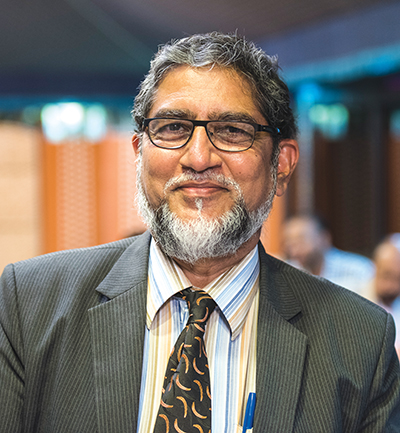 Dr. Shaikh Shakil Anjum, DTM
Dr. Shaikh Shakil Anjum, DTM
After his time in the desert, Shakil Anjum returned to India in 1986 to serve as a lecturer teaching medical courses at a junior college in Pune, and he was also an honorary lecturer at Unani Medical College, where he had a private practice for eight years. After two more job transitions in India, he moved back to the desert of Saudi Arabia in 1997 to work as a physician for National Pipe Company Ltd. He still works there today, but now lives in the city of Al-Khobar with his family.
Shakil Anjum, DTM, joined Toastmasters in 2007 and is on his way to earning his 12th Competent Communicator award. He believes that learning is a continuous journey and not a destination. When he’s not busy attending meetings at his five clubs, he enjoys conducting Youth Leadership programs and supporting Gavel clubs.
Why did you become a doctor?
I originally aspired to be an actor, but my cousin’s death due to cancer became a turning point in my life, and advice from my grandparents helped me to select this path. I am a general practitioner, and also have interest in alternative medicines.What’s it like practicing medicine in the desert?
In my experiences in Saudi Arabia, I worked for companies, not hospitals. As most of these companies were based in the desert, along with the entire community, I stayed in deserts only. I treated patients who were company employees as well as the local residents.I see different types of patients in the desert: a) Seasonal—in climatic changes we have such cases. Winters will precipitate muscle and joint pains with skin problems. Summers increase the cases of heat exhaustion, heat stroke, humidity dermatitis and renal issues. b) Chronic cases—hypertension, diabetes, etc. c) Emergencies—including medical and surgical.
Tell us about your current job.
The National Pipe Company’s manufacturing plant is 30 kilometers (about 18 miles) away from the main city toward the desert. The plant employees work around the clock, so I am there during the daytime until evening, and then on call for 24 hours in case of emergencies.
I look after the welfare of the employees like they are my family members. I cover the day-to-day management of sick patients, following up in hospitals and getting them treated. I look at different medical problems or sports injuries and even look into the employees’ family illnesses. I provide counseling for them, so they are well aware of the diseases.
I also lecture on safety and prevention measures and help the company in supervision of the kitchen food quality, and periodically check up on food handlers and other employees for occupational hazards, etc. There is no end of responsibilities—anything related to the welfare of our employees, I am there.
How has Toastmasters played a role in your career?
Toastmasters gave me a positive environment, a battery of friends with positive attitudes, and taught me the importance of a pause and, of course, time management. Even though I never felt any difficulty with communication early on, Toastmasters has taught me to concentrate on words, sentences, grammar, and phrases and quotations. I did not pay any attention to these factors before. I am still learning, and I realize my mistakes even now. For those who cannot express themselves, what better place to learn than Toastmasters?Any advice you’d like to share?
Once a Toastmaster, always a Toastmaster. When you complete a DTM, irrespective of how much time you take, enjoy it while completing it. And do not stop after completing it; continue to do your projects again and again. This will not only make you a better speaker, but also a better human.
Shannon Dewey is a former digital strategy and engagement editor of the Toastmaster magazine. Reach her at sdewey@toastmasters.org.



 Previous
Previous
 Previous Article
Previous Article